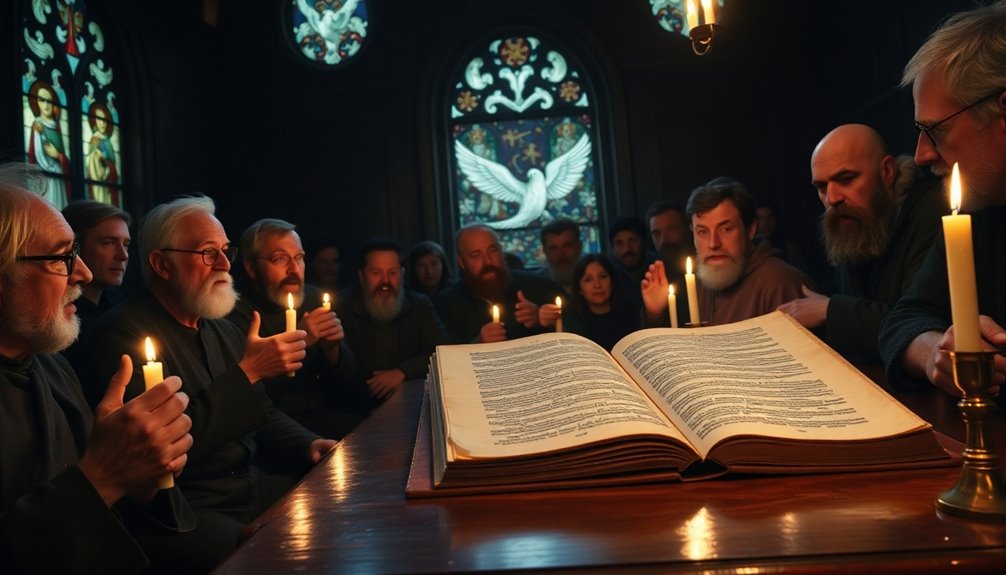The Holy Spirit is the Third Person of the Trinity, fully God, and essential in your faith journey. He empowers you with spiritual gifts and acts as your counselor and guide. Through the Holy Spirit, you experience divine wisdom and community, helping you navigate life's challenges. You'll find references to His role throughout the Bible, from creation to the birth of the Church. Understanding the Spirit can clarify misconceptions and enhance your spiritual practices. As you explore, you'll discover deeper insights into how the Holy Spirit actively interacts with you and your faith.
Key Takeaways
- The Holy Spirit is the Third Person of the Trinity, fully God and an integral part of Christian faith and life.
- Acts as a counselor and guide for believers, empowering them with spiritual gifts for service within the Church.
- The Holy Spirit played a crucial role in significant biblical events, such as creation, Jesus' baptism, and the Pentecost.
- Misconceptions about the Holy Spirit include viewing it as an impersonal force rather than a divine Person with emotions and will.
- Daily spiritual practices, such as prayer and scripture reflection, invite the Holy Spirit's guidance and foster community among believers.
Introduction

When it comes to understanding the Holy Spirit, it's essential to recognize His significance within Christian beliefs. The Espíritu Santo, as the tercera Persona de la Trinidad, is fully God, coexisting with the Father and the Son.
He's not just an abstract concept; He's a divine being with a mind, emotions, and will, capable of experiencing feelings like sadness. You'll find that the Holy Spirit acts as a consejero and guide, promised by Jesus to help you navigate your spiritual journey.
In the Nuevo Testamento, the Espíritu Santo plays a crucial role in the life of Jesus and the formation of la Iglesia. He empowers believers, providing dones that enable you to live in accordance with la voluntad de Dios.
These gifts manifest in your life, reflecting the poder de Dios and enriching your spiritual experience. As you engage with the teachings of the Holy Spirit, you're not only learning but also growing in your faith.
The gifts and fruits of the Spirit allow you to embody spiritual qualities that enhance your daily life, making the Holy Spirit an integral part of your Christian walk.
Biblical Verses on the Spirit

When you explore biblical verses on the Holy Spirit, you'll find both primary and secondary references that highlight its significance.
For instance, Genesis 1:2 showcases the Spirit's active role in creation, while Matthew 3:16 reveals its divine presence at Jesus' baptism.
These verses not only illustrate the Spirit's power but also its ongoing influence in the lives of believers.
Primary Bible References
The Bible offers several powerful references that reveal the significance of the Holy Spirit in both creation and the lives of believers. In Genesis 1:2, we see el espíritu de Dios moving over the waters, emphasizing its essential role in la obra del creation.
Moving into el Nuevo Testamento, Matthew 3:16 highlights the moment of Jesus' bautismo, where the Espíritu Santo descends like a dove, symbolizing divine approval and presence.
Acts 1:8 promises you that through the Holy Spirit, you'll receive el poder de to be witnesses for Christ. This promise is dramatically fulfilled in Acts 2:2-4 during the Day of Pentecost, when the Holy Spirit filled the disciples, enabling them to speak in various languages and marking the birth of the early church.
Furthermore, Romans 8:26-27 illustrates how the Espíritu Santo acts as intercessor, helping you in your weaknesses by praying for you according to God's will.
Through these verses, you can see how the tercera Persona de la Trinidad actively engages in your spiritual journey, offering los dones, guidance, and support in your everyday life.
Secondary Bible References
Many verses throughout the Bible further illuminate the role and work of the Holy Spirit. In Genesis 1:2, you see the Espíritu Santo actively moving over the waters during creation, showcasing His integral part in the universe's formation.
Then, in Matthew 3:16, the Spirit descends like a dove during Jesus' baptism, symbolizing divine approval and His involvement in Christ's ministry.
Acts 1:8 promises that believers will receive poder when the Holy Spirit comes upon them, empowering you to be a witness for Jesus. This power is crucial for carrying out la obra of God.
Galatians 5:22-23 describes the frutos del Espíritu, the qualities you should exhibit when led by the Holy Spirit, reflecting His nature as una Persona de la Trinidad.
Moreover, Romans 8:26-27 reveals that the Espíritu Santo intercede for you, guiding your prayers according to God's will, especially in moments of weakness.
Additionally, the Spirit enables el hablar en diversas lenguas, illustrating His dynamic role in the life of believers. Each verse highlights how the Holy Spirit is essential to your spiritual journey and relationship with God.
Early Church Doctrinal Debates

Throughout the early church, significant doctrinal debates emerged concerning the nature and role of the Holy Spirit, especially in relation to the Trinity. The iglesia primitiva grappled with whether the Espíritu Santo was a created being or coeternal with the Father and the Son, a question central to the controversia arriana of the 4th century.
This led to the development of the Nicene Creed, which affirmed the divinidad of the Holy Spirit as fully God and an essential part of the Trinity.
The Filioque clause became a point of contention between Eastern and Western Christianity, claiming that the Holy Spirit proceeds from both the Father and the Son. This disagreement significantly contributed to the Great Schism of 1054.
Furthermore, discussions about the Holy Spirit's role in salvación and sanctification shaped the early Christian understanding of spiritual gifts—dones espirituales—within the community. Practices like sanación were influenced by these debates, highlighting the Holy Spirit's active presence in believers' lives.
These doctrinal disputes not only defined the essence of the Holy Spirit but also laid the framework for orthodox Christian beliefs that continue to resonate today.
Historical Context of Pneumatology

Pneumatology, the study of the Holy Spirit, emerged within a rich historical context shaped by both Jewish monotheism and the diverse beliefs of the Greco-Roman world. The early Church grappled with understanding the Espíritu Santo as a persona divina within the framework of the Trinidad. Key figures like Tertullian and Athanasius played pivotal roles in developing this theology, emphasizing the Holy Spirit's equality with the Father and the Son.
In 325 AD, the Nicene Creed solidified this belief, affirming that the Espíritu Santo proceeds from both the Father and the Son, which became a cornerstone of Christian faith.
As you explore this history, you'll notice that debates about the naturaleza and don of the Holy Spirit continued through the Middle Ages, particularly during the Filioque controversy, which divided Eastern and Western Christianity.
The Reformation added another layer, as influential figures like Martin Luther and John Calvin highlighted the Holy Spirit's vital role in the vida of believers.
This historical context shows how pneumatology evolved, showcasing the dynamic interplay between tradition, scripture, and interpretation within the Iglesia, shaping the understanding of the Holy Spirit today.
Misunderstanding the Holy Spirit's Role

You might think of the Holy Spirit as just a force or an abstract concept, but that's a common misconception.
Many people misinterpret the Spirit's role, especially regarding spiritual gifts and the way He actively works in believers' lives.
Understanding the Holy Spirit as a divine Person with a specific purpose can transform your spiritual experience and deepen your faith.
Debunking Common Misconceptions
Many people harbor misconceptions about the Holy Spirit's role, often viewing Him as an impersonal force rather than a divine Person. In reality, the Espíritu Santo is a Persona divina, as confirmed by la Biblia. He possesses a mind, emotions, and will that engage actively in the lives of believers.
Misunderstandings arise from how we interpret masculine pronouns in las Escrituras, which highlight His active role in divine functions rather than implying personhood.
Some also think the Holy Spirit lacks a personal name, but this doesn't diminish His personhood. He's distinct yet fully God within the Trinidad. It's crucial to recognize that the Holy Spirit doesn't merely act under Dios's direction; instead, He works in harmony with the Father and Son.
Moreover, the belief that the Espíritu Santo is just a manifestation of God's action overlooks His unique atributos, like omnipresence and omniscience. The Scriptures illustrate these qualities, especially in Psalms 139:7-8 and 1 Corinthians 2:10-11.
Understanding the Holy Spirit's true role clarifies His vital contribution to your vida and faith.
Misinterpretation of Spiritual Gifts
Misunderstanding spiritual gifts can create confusion about their true purpose within the church. Many people see regalos espirituales as mere personal talents or abilities, overlooking their divine origin from the Espíritu Santo. These dones are designed to serve the iglesia and glorify God, not to elevate individual status.
When you recognize that spiritual gifts are meant for the collective, it fosters a deeper understanding of community and interdependence among believers. Without this understanding, competition and division can arise, undermining the unidad that the Holy Spirit aims to cultivate.
Each believer receives gifts according to the voluntad of the Espíritu Santo, which means diversity is essential. Not everyone will have the same gifts, and that's a beautiful reflection of how the Spirit works in different ways.
Additionally, it's vital to distinguish between spiritual gifts and the frutos del Espíritu, such as love and kindness. While the latter are character traits developed through the Holy Spirit's influence, the former are specific abilities meant to build up the body of Christ.
Daily Spiritual Practices

Daily prayer is a powerful way to invite the Holy Spirit into your life, guiding you as you navigate your faith.
Group prayer sessions can amplify this experience, creating a shared sense of purpose and connection among believers.
Together, these practices strengthen your relationship with the Holy Spirit and enhance your spiritual journey.
Daily Prayer for Guidance
In the quiet moments of each day, inviting the Holy Spirit into your prayer can profoundly shape your decisions and actions. Through oración diaria, you seek the Espíritu Santo's guía and sabiduría, allowing His presence to illuminate your path.
When you set aside dedicated time for prayer, you foster a personal relationship that enhances your crecimiento espiritual.
Engaging in prayerful reflexión opens your heart to the Holy Spirit's influence. As you meditate on scripture passages, like James 1:5, you learn to consistently seek divine wisdom. This practice not only helps you navigate life's complexities but also deepens your understanding of God's will for your vida.
Embracing gratitude in your prayers acknowledges the Espíritu Santo's guidance and prepares you to receive further insights. Each moment spent in prayer allows you to reflect on your decisions, ensuring they align with divine purpose.
Group Prayer Sessions
Gathering together for group prayer sessions creates a powerful environment where believers can collectively seek the Holy Spirit's guidance and support. In these grupo de oración, you and your community of fe come together to interceder for one another, aligning your requests with la voluntad de Dios.
This collective effort not only enhances your awareness of the Espíritu Santo but also deepens your connection to God and each other.
As you engage in these sessions, you'll experience the fruits and dones of the Espíritu Santo in a vibrant way. The power of shared prayer amplifies spiritual gifts, encouraging growth and strength in your faith journey.
Regular participation fosters an atmosphere of comfort and empowerment, allowing you to witness la obra del Espíritu Santo in action.
Moreover, these gatherings provide an opportunity to share insights and testimonies rooted in la Biblia, reinforcing your understanding of God's presence in your lives.
By participating in group prayer, you contribute to personal y crecimiento espiritual while nurturing a supportive community that thrives on collective faith and shared experiences.
Embrace the joy of group prayer, and watch how it transforms your spiritual life.
Spiritual Gifts Empower Daily Life

The Holy Spirit's spiritual gifts empower you to navigate life's challenges and enrich your interactions. By receiving these dones, such as wisdom, knowledge, and faith, you're equipped to serve your comunidad and strengthen the iglesia. Each gift is a reflection of the Espíritu Santo's power, meant not for personal gain but for the edificación of others.
When you embrace your spiritual gifts, you contribute to a greater purpose, fostering unity and collaboration among believers. This collective service enhances your faith and helps you embody the fruits of the Spirit—love, joy, peace, and patience—in your daily life.
As you engage with others, these gifts guide your actions, allowing you to reflect Christ's love and truth. You'll find that relying on the Holy Spirit makes it easier to face challenges while encouraging those around you.
Through service, you not only fulfill God's purpose but also experience the joy of being part of something bigger than yourself. Empowered by the Espíritu Santo, you become a vital part of your community, helping to build a supportive environment where everyone can thrive.
Additional Resources

Exploring your spiritual gifts is just the beginning of your journey with the Holy Spirit. To deepen your understanding of the Espíritu Santo and its role as a Persona divina within the Trinidad, you can access valuable resources.
"Awake!" magazine offers insightful articles that clarify the Holy Spirit's influence in daily life, helping you grasp its significance in your spiritual journey.
You can also find various discussion platforms that tackle common misconceptions about the Espíritu Santo, enhancing your understanding of its divine nature. Historical context studies provide a comprehensive overview of how belief in the Trinity, including the Holy Spirit, evolved over time, giving you a richer background.
If you're eager to dive deeper into la Biblia, consider enrolling in free Bible study classes. These classes focus on the teachings concerning the Espíritu Santo, allowing you to understand how this divine gift enhances your spiritual life.
Through these resources, you'll not only learn about the don of the Holy Spirit but also how to apply its teachings to your life, strengthening your relationship with Dios and enriching your spiritual journey.
Frequently Asked Questions
What Is the Holy Spirit According to the Bible?
The Holy Spirit, according to the Bible, is the third person of the Trinity, fully God and essential to your faith.
He's omnipresent, meaning He's with you everywhere, as noted in Psalms.
In Acts, you see Him empowering believers to witness for Christ.
He guides and comforts you, as promised by Jesus.
The Spirit also provides you with gifts and fruits, which enrich your spiritual life and help you grow in faith.
Who Is the Holy Spirit and What Does He Do?
The Holy Spirit is God's presence in your life, guiding and empowering you every day.
He comforts you when you're in need and convicts you of sin, helping you grow in righteousness.
The Holy Spirit gives you spiritual gifts and fruits, like love and peace, enabling you to serve others.
What Is the Holy Spirit and What Is Its Mission?
The Holy Spirit's a divine presence that guides and empowers you in your spiritual journey.
Its mission centers on comforting you, helping you grow in faith, and deepening your relationship with God.
The Holy Spirit convicts you of sin and righteousness, prompting repentance and transformation.
Additionally, it provides spiritual gifts and fruits, enabling you to live in alignment with God's will and serve others effectively in your community.
When Does the Holy Spirit Come to a Person?
The Holy Spirit comes to you at the moment of your salvation when you accept Jesus Christ as your Lord and Savior. This event marks you as God's own, giving you assurance of your salvation.
Additionally, the Holy Spirit can empower you during significant spiritual moments, like baptism or prayer.
It's essential to rely on the Holy Spirit continually, as it helps you grow in your faith and live according to God's will.









